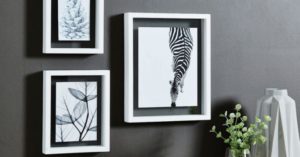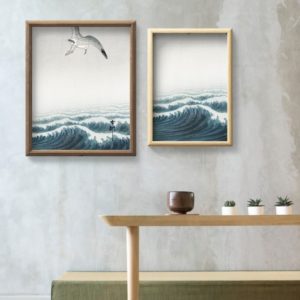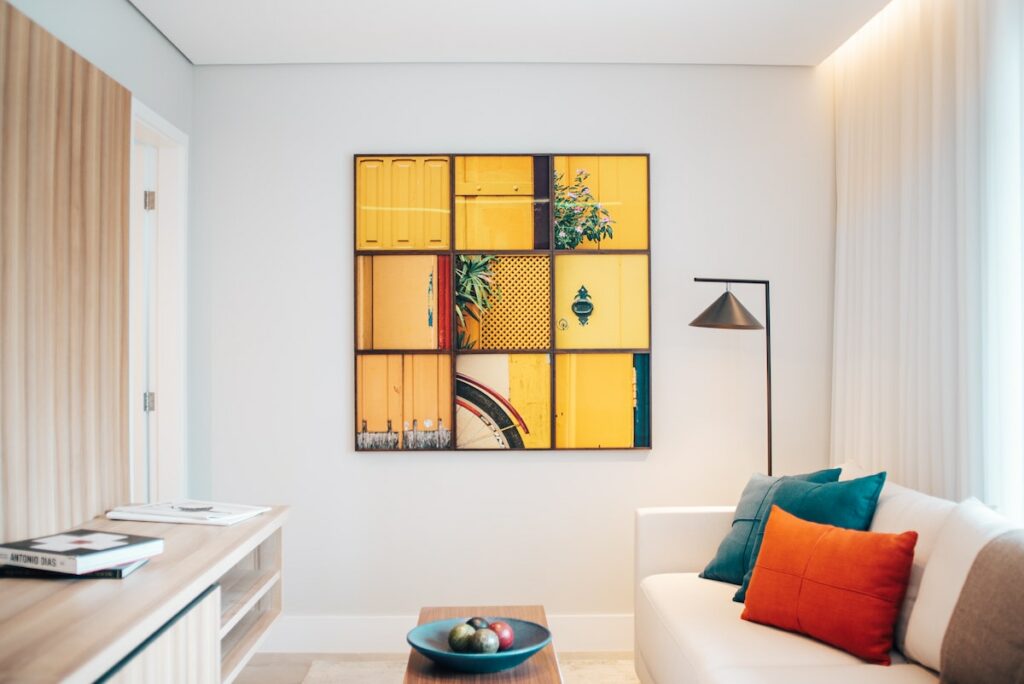Ever heard of floating frames, and wondered what they actually are? If so, you’re not alone. Floating frame prints are relatively new, but have grown quickly in popularity. A floating frame for canvas pictures can offer a more chic, contemporary look for your wall art as it mimics the look of a gallery artwork.
Gallery artworks often use floating frames so that the artwork isn’t touching the frame itself, as artworks can often be delicate. This framing technique ensures the artwork is preserved for longer.
So, what is a floating frame and how can you style yours in the home?
What is a floating frame?
First up, what’s a floating frame? As you’ll have no doubt already guessed, floating frame prints are given their name because they give the illusion that your canvas picture is actually “floating” within the frame surrounding the picture. This is because the picture itself sits away from the frame, instead of disappearing behind the frame itself.
Most floating frame canvas prints use a wooden frame on the outside, with a slight gap in between the frame and the edge of the canvas picture. The frame gives definition to the picture itself, and creates visual space around the canvas, so the eye can better appreciate it.
If you want that “gallery-style” look, floating frames are your answer. Most floating frame prints also don’t hide the canvas print behind glass. This is a decided advantage, as the texture of the canvas print is often what gives your print depth, creating an interesting look.
Unlike other frames, floating frames allow you to see all the way to the edge of the artwork. That means that none of your beautiful picture will be obscured by the frame.
To frame or not to frame?
There’s no doubt floating frame prints look elegant and sophisticated in any home. But how do you decide if your wall art or canvas prints will look better with a frame, or without?
Both framed and frameless canvas prints can look fantastic in any setting. What you eventually settle with will really depend on personal preference.
That said, there are several reasons to choose a beautiful floating frame print. For instance:
- Your picture doesn’t match with the surrounding décor. Perhaps it’s a contrasting style or colour. Choosing a similar-looking frame to your other interiors can help tie all your home décor together, making it look more cohesive
- The background of your canvas matches the wall colours. So for example you have a white print but your wall is also white. In this scenario, your beautiful canvas print will blend in with the surrounding wall, instead of “popping” and attracting the eye. A floating frame can be a great way to get around this and create a strong contrast against your canvas print and the wall
- Most of the artwork in your room is already framed. While it’s true that you don’t need to perfectly match all your frames, if you want your new print to sit beside five other framed pictures, you might prefer it to also be framed so it doesn’t look out of place
- You prefer a more finished look or don’t like the frameless look, yet still love the texture of canvas. In this scenario, floating frame prints are the perfect option
- Your print will be around little ones and you don’t want the edges of your canvas to be bumped or damaged. Perhaps it’s in a common area in your house, or in your child’s room where it has the potential to be knocked around a little. In these scenarios, a floating frame canvas print can provide your precious picture more protection than frameless canvas prints.
By: Baboo
Styling your floating frame prints
Hanging your floating frame is often more difficult than it seems. So how do you style your prints so that they work with your other interiors pieces?
Firstly; the frame. When choosing a canvas with floating frame, you’ll want to consider a versatile frame, so that even if you move your picture from room to room, it will still look fabulous. At Canvas Factory, we have three frame choices for our floating frames; black, white and wood grain.
This range of neutral choices means that any picture you choose will always look beautiful within your floating frame and will stand out, yet will be versatile within their environment.
Other than that, you can style floating frame prints the same way as you would style any picture. Creating a beautiful wall display is really about experimentation and personal preference, but there are some tried-and-tested ways to hang your pictures.
Arranging your floating frame print
You can group and style your pictures in a multitude of ways. Start by considering how many pictures you have (or want to have), and whether you’d like to group frames together by theme, colour or style. For instance, you may want to display all your travel photos together in one cluster in your dining room, then save your more personal photos for a more private room in the home. Or, you could style by print colour or frame colour.
There are endless ways to style your pictures, such as:
- Grouping 2, 3 or 4 larger floating frame canvas prints together in a wall display
- Grouping a large number of pictures hung together in a gallery-style cluster (more on this soon!). If you consider your style more romantic or eclectic, this style might be better for you
- Creating a symmetrical or “grid” display of the same-sized pictures hung in a square or rectangle-shaped formation. Grid displays generally result in a more classic or structured look.
Creating a gallery wall
As a general rule, when creating a gallery wall, don’t start hanging until you know what the entire gallery wall will look like, or you’ll be hammering holes in walls unnecessarily.
To avoid removing hooks, build the whole wall display out on the floor beforehand. Lay it all out the way you want it to look on your wall, swapping, adding and re-arranging as necessary. You might want to balance any floating frame prints diagonally opposite to each other. Add larger prints in the centre and then build out to smaller prints as you move outwards.
After you have laid out your prints on the floor, measure up masking tape on the walls. Or, you could even cut up some art paper in the exact sizes and formations that you want your pictures to be in, and stick it to your wall.
This way, you’ll be able to see exactly what your picture sizes and shapes look like before they’re hung.
Print styling tips and tricks
Although there are no set rules for styling your canvas prints, there are some tips and tricks which can make the whole process much simpler.
- Stick to an odd number of pictures, unless you’re creating a grid-like wall display; in which case it doesn’t matter what number of pictures you have
- When it comes to matching wall art with various rooms, consider the colour palette for each room. You can even choose colours from your pictures and match your home décor accordingly, using one or more of the colours in the picture or pictures
- When picking pictures or photos, include a mixture of different kinds of photos. For example, use a combination of close-ups, wide shots, group photos, photos of flowers. This ensures your display has depth and variety and creates intrigue for the eye. As long as the images are tied together with a similar colour palette, it will work
- Don’t feel that every single frame needs to be the same colour; it doesn’t. However, if you have black frames for everything then add one random woodgrain frame or frameless canvas, it might look a little odd
- Begin with a larger centrepiece in the middle. This works as an “anchor” piece which will tie everything together. Then work your way down, up and outwards, with the larger pieces closest to the centre and the smallest on the outsides
However you decide to style your wall art, floating frame prints can be a beautiful way to make your favourite canvas prints stand out and really shine. Canvas Factory offers a range of frame options and sizes so you can personalise your prints and make them stand out.
So, what are you waiting for? Click here to check out our floating frames today!










